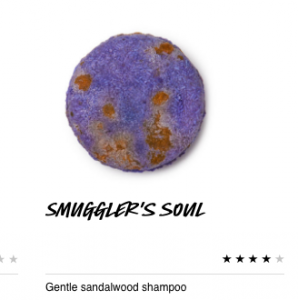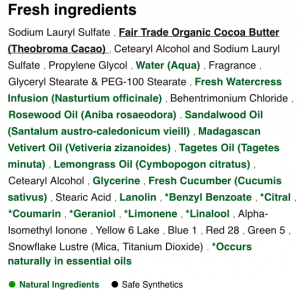Are all natural bars of soap what they say there are?
Is your bar soap – healthy, natural, safe? Let’s find out.
I came across a shampoo bar that Lush sells, now I know many people
 that buy from Lush because they use organic and Fair Trade ingredients…that’s awesome. So this particular bar is a shampoo bar, scented with sandalwood.
that buy from Lush because they use organic and Fair Trade ingredients…that’s awesome. So this particular bar is a shampoo bar, scented with sandalwood.
As you can see it is listed as a Gentle Sandalwood Shampoo.
Sounds good………….
If you click on the picture on the Lush site it will take you to the page where you can order, on that page is a link to the ingredients. Which say “Fresh Ingredients” and then lists the ingredients in this fine shampoo bar.
So I’m thinking to myself hmmmm what do they mean by Fresh Ingredients so I go to the Merriam Webster Dictionary, because all I’m thinking is fresh fruit lol. So here is what I found:
Simple Definition of fresh
- newly produced, gathered, made etc, not preserved by being frozen, canned etc.
- not spoiled or old
- clean and pure
Well that sounds good so this bar is made with ingredients that are newly gathered or produced, not spoiled or old (that’s good) and clean and pure ingredients. Still sounding good to me.
The ingredients list – what it includes
 Well it turns out the ingredients list contains Natural and what they call safe synthetics. Well let’s have a look at them.
Well it turns out the ingredients list contains Natural and what they call safe synthetics. Well let’s have a look at them.
The natural ingredients are: Water, Fresh Watercress, Rosewood Oil, Sandalwood Oil, Madagascan Vetivert Oil, Tagetes Oil, Lemongrass Oil, Glycerine, Fresh Cucumber, Lanolin, now the last few that have the *sign in front of them which means “Occurs naturally in essential oils” that’s true but these are also synthetic ingredients. So are they using the synthetics and just letting us know they do occur naturally also? Here’s the list:
Benzyl Benzoate – this does naturally occur in many fruits and plants as well as some teas. Benzyl Benzoate is also found in Jasmine, Hyacinth and Ylang-Ylang essential oils, but most often the synthetic version will be used in soap making. It is used as a preservative.
Citral- it naturally occurring in verbena, lemongrass and orange, but is also produced synthetically.
Coumarin – this is a naturally occuring scent, but most often the synthetic form is used in soap and cosmetic products.
Geraniol – is naturally occurring in Rose and Citronella Oil – this is also produced synthetically.
Limonene -is used for scenting, it is created and heavily processed from natural orange peels, also synthetically produced from petroleum.
Linalool – a natural scent that is derived from wood, also synthetically produced from petroleum.
Now for the Safe Synthetics
At this point I’m really wondering why so many ingredients. I’m going to have to give you my shampoo bar recipe at the end of this article.
There are so many listed: Sodium Lauryl Sulfate, Cetearyl Alcohol and Sodium Lauryl Sulfate, Propylene Glycol, Fragrance, glyceryl Stearate & PEG-100 Stearate, Behentrimonium Chloride, Cetearyl Alcohol, Stearic Acid, Alpha-Isomethyl Ionone, Yellow 6 Lake, Blue 1, Red 28, Green 5, Snowflake Lustre, Mica, Titanium Dioxide) Wow!!!!
So why are all these added to this soap well I guess because Sodium Lauryl Sulfate is a detergent that helps the product produce bubbles or foam and Cetearyl Alcohol helps to thicken the product and produce more bubbles. Stearic Acid helps to harden the bar, then you have your scent (Fragrance) and the colors Yellow 6, Blue 1 and so on.
And of course let’s not forget the
PEG – 100 Stearate which is an ester of polyethylene glycol, and Propylene Glycol – also called propane-1,2-diol…..need I say more? It’s used as a penetration enhancer, so that means it is helping to penetrate into your skin, everything else that’s in this soap……think about that.
So, I still am not sure what the Fresh ingredients mean….and at this point I think I’ll go make a batch of my own shampoo bar….what do you think?
© 2016, Tes. All rights reserved.
In 2012, I moved to an area that had hard water. My first experience was rather odd. I’d moved in with my father to help take care him after he had a stroke. I noticed his skin was extremely flaky. I mentioned it to his physician and she suggested moisturizer. After a few weeks, I noticed my skin starting to flake also. It was insane… and gross. It was bad enough having to look at it on my father’s skin, but I have to live IN my skin!
I mentioned it to my husband, who hadn’t moved to live with me yet. He told me to check the faucets for deposits. Sure enough, white deposits circled all the faucets. Hard water!
I found that hard water and soap don’t make for a good combination. Rather than rinsing soap away, hard water causes soap to stick to the skin, causing a residue and drying skin out. Since then, I’ve used soap sparingly.
One of the things I like about your homemade soap recipe is the idea of using oil to clean. Rather than drying the skin out, like soap does, it cleanses while also moisturizing.
Hi Renee,
Thanks for sharing your story, I also have very hard water and the soap I make gives lather, washes away clean and moisturizes your skin as well. It took awhile to get the recipes right, but they do work well. Coconut oil and Castor oil will give soap a natural lather even in the hardest of water, so there is no need for additives. The coconut oil will give light bubbles and the castor oil will give a creamy lather. We don’t need a long list of ingredients to make nice soap that’s for sure.
You asked at the end of your post, “What do you think?” Well, I think just what you thought. We better all just make our own!. I’ll tell you what, the ingredients that these manufacturers put into their products is endless and seemingly unnecessary. I’m sure there is a purpose for the ingredients, but what is it? It sure isn’t to make it nice a natural and safe for us, is it? I’m 65 yrs old, and I have been hearing about making your own soap all my life. There’s still nothing better that natural. It may be a bit more work, than to just go down to the store and buy something, but at least when you make it yourself, you know what you have. Thanks for the informative and thought provoking post.
Yes Jim, it really is sad the amount of unnecessary ingredients these manufacturers put into skin care products, natural skin care is the best, but even at that we have to be careful because some of these big companies claim to be natural, but really are not….it’s in the wording so sad. My skin is so sensitive that I had no choice but to make my own. It’s a bit of work, but well worth it, and if a person can’t make it themselves, you can always find small soap makers selling at your local farmer’s market or craft fair. Thanks for your comments
I love handmade products and envy those who make their own beautiful bar soap. I have contemplated making them but the list of ingredients scare me.
If time permits, I would like to try my hands in this. What are the basic tools, materials and ingredients for a beginner? Is there a beginner’s kit to start off with? Since I have dry skin and often look out for soap with neutral ph level, what will you recommend me do?
Thanks in advance.
Hi Sharon,
You don’t have to start off with a huge list of ingredients. Try one of these recipe the first time just a few ingredients to get your started. Soap Making Recipes and here is a list of what you’ll need to get started Home Made Soap Making Supplies if you are looking for a kit to get your started then I would suggest checking this link to one sold at amazon. http://amzn.to/2z7OTzC